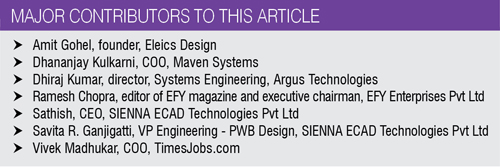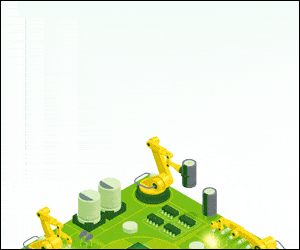At another PCB designing firm SIENNA ECAD Technologies Pvt Ltd, Savita R. Ganjigatti, VP engineering – PWB Design informs, “Yes, we recruit freshers and offer them training for a year. During the training period, a stipend of 10,000 per month is provided and, on confirmation after a year, they are offered a minimum of 200,000 per annum.” “We recruit from other engineering institutions and focus on skill-oriented candidates rather than the institute. But for signal/power integrity and EMI analysis, we recruit masters degree holders particularly,” complements Satish.
Going by the statistics provided by TimesJobs.com, a massive 44% of the jobs in the PCB industry are in the salary range of 100,000 to 250,000 rupees per annum. Around 28% jobs for junior-level professionals pay anywhere from 250,000 to 500,000 rupees per annum, while 18% jobs for mid-level pay between 500,000 and 1,000,000 rupees.
Demand areas
According to TimesJobs.com, the manufacturing and engineering industry tops the list of industries hiring engineers to work in the PCB design domain with about 34% share of jobs, followed by the IT industry with a share of 26%. IT-hardware/semiconductor and networking industries offer 14% of the jobs.
Apart from Bengaluru with 27%, the list of top locations for jobs in PCB design field indicates Hyderabad, Chennai and Mumbai sharing 12%, 10% and 9% of the pie, respectively. Remaining jobs are scattered in other locations.
Skills required
Printed circuit board designers utilise computer-aided design (CAD) tools to create circuits that are accommodated on these boards. They must also be able to specify how the connections will be shown. Some designers perfect themselves in digital or analogue designs while others work on the routing layout. They make sure that the final design works as expected and meets industry requirements, before it is sent to the manufacturing facility for PCB fabrication.

EFY is opening training centres all over India where hands-on PCB designing is a favourite course among the engineering students and trainees from the industry. Mentioning about the 3-day introductory course, Ramesh Chopra, editor of EFY magazine and executive chairman of EFY Enterprises says, “Our objective is to introduce the students to PCB designing by teaching them the fundamentals using an open source software like gEDA. Since the trainees are from electronics field, they learn the skills quickly. Of course, they need to practice thereafter if they wish to become experts in the field,”
Usually, each PCB designer works as part of a team whose members are responsible for different portions of the design. With large, complex boards, several designers can be assigned to each board and each person made responsible for a different set of functions. Even though a designer works independently, the team usually communicates through frequent meetings and thorough documentation. Therefore each designer is expected to communicate ideas verbally and explain the PCB design in detail as well.
Near future
Though there has been a steady progress in the level of engagement between academia and industry, still there is a lot to be done suggest industry experts. Industries need to come forward and set up labs (with respect to DSP, FPGA, wireless technologies, EDA tools) for engineering colleges, which requires investment both in terms of engineering resources as well material (cost of development kits, tools). Kumar says, “But, at the same time, engineering colleges should be willing to accommodate industry-sponsored courses as well as labs in their curriculum, which at times might look like brand building tools for sponsoring companies with one-sided views.”
Industry and educational institutes should work together to identify and train employable graduates in this field, as there is a tremendous need for such niche activity. “PCB designing is a stable industry as development never ceases and growth is assured at the rate of more than 20% if the performance is excellent and there is a proven track record,” believes Satish.
The author is a senior technical correspondent at EFY










